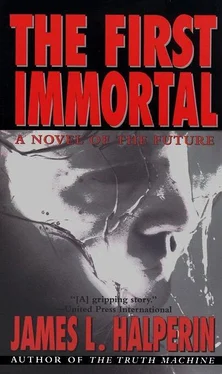Some of the artwork, invariably those compositions signed by the eldest child, possessed an engaging, mathematically evolved synchronicity of design, and a refined balance of color and light. But even these works were rarely admired, at least not by Ben. With so many toys scattered about, it was perilous to walk the halls without looking down.
Marge prepared French toast with maple syrup and sausages. Ben concocted a huge mushroom, onion, and ham omelet.
All three older children had returned home from summer camp; the whole family was now together. Ben had arranged a part-time schedule so he could spend more time with them before school resumed in two weeks.
Rebecca and Maxine wandered into the dining room just as breakfast reached the table. Marge sent Rebecca back upstairs to rouse Gary. He’d been up late the night before, as usual; studying, reading, and drawing.
But far from being proud of his son’s artistic and scholastic accomplishments, Ben considered his own childhood, and Gary’s suffered by comparison. Sure, at Gary’s age he had studied hard, but not constantly , for chrissake; Ben also remembered hanging out with friends, playing sports, and spending time with his parents and relatives, listening to the radio or just relaxing. He’d never been that obsessive, had he? Hell, Gary rarely even watched TV with his sisters. It was hard to remember when the boy had last left his room at all after school, except to eat.
Two days ago the Smiths had bought their first color television. Barely twenty-five years earlier, Ben had had trouble convincing Toby that a “radio with moving pictures” was even scientifically possible. And now they could broadcast films in every hue of the rainbow. In a few more years, they would barely notice. Amazing!
The girls noticed today, though, and insisted the set remain on in case some program actually appeared in color, which none did; most color broadcasts were scheduled for evening.
Nineteen-sixty was an election year, so Ben, Marge, and their children—thirteen-year-old Gary; Rebecca, nine; Maxine, eight; and Janette, six—talked about politics at the breakfast table. Ben and Marge declared their intentions to vote for Richard Nixon, although she seemed less convinced than he did.
“Kennedy’s so much cuter,” Rebecca interjected. “I’d vote for him over Nixon any day.”
Ben scowled at his daughter, but with a distinct twinkle in his eye. “That’s some reason to vote for a presidential candidate.” He laughed, and she laughed back. Ben would have done anything for his girls, and they all knew it.
“Kennedy was talking about whether we should send men to the moon,” Maxine volunteered.
Ben almost said: I wish he’d put himself and most of his family there. But instead he smiled. “Grandma Alice told me some of her friends are worried. They think going to the moon might be against the will of God. How do you feel about it?”
“I think it’s kinda cool.” Rebecca giggled.
“Oh, but I agree with Alice’s friends,” Marge deadpanned. “Space travel’s so… artificial. We should all stay home and watch television—like God intended!”
Everyone laughed.
“I’m not sure I l-like Nixon,” Gary announced nervously. “He s-seems phony.”
Ben felt inexplicably offended. Nixon was General Eisenhower’s vice president, for chrissake! An image flashed through his mind of Mack McGuigan risking his life to rescue him. Japanese sailors had often left their wounded behind, but that wasn’t the American way: Ike’s way. Ben believed that Mack, Eisenhower, and therefore Nixon, were somehow akin. Voting for anyone else would almost be a betrayal. “Eisenhower was a great general, and an even better President. If Ike thinks Nixon’s up to the job, that’s good enough for me.”
Gary cowered at Ben’s tone, but Marge smiled at him, pleased that he was willing to express an honest disagreement with his father.
“I know what you mean,” Marge said to Gary. “Nixon’s smart enough. Still, if people don’t trust him, he can’t be effective as President. I’ll probably vote for him anyway, but I’m keeping an open mind till Election Day.”
Emboldened by his mother’s words, Gary added, “Our P-President seems like a good man, but nobody’s perfect. I, uh, read something about him a few weeks ago in the Herald. According to the article, Eisenhower was sh-shocked and alarmed when someone told him half the p-people in the United States have average intelligence or less!”
Marge and Rebecca both laughed, but Ben felt his anger rising up like steam from a boiling kettle.
“Bull—” he said, but caught himself. Hell, if one of the girls had said what Gary did, he’d have been proud, not angry. So he backtracked. “Well, Grandma Alice always told me that God gave us brains so we could think for ourselves. And she was right. When you’re old enough to vote, Gary, just try to get all the facts you can, then trust your own judgment.”
He even tried to smile at his son, but couldn’t quite pull it off.
Gary, only minimally aware that he’d just won a small skirmish with his father, knew to leave well enough alone. But Marge rubbed her son’s shoulder and beamed.
Damn! Why couldn’t he like his own son? Ben felt ashamed, yet baffled. Old habits died hard, he supposed. Apparently he just hadn’t been ready for a child when Gary came into the world.
After making his promise to Marge on Gary’s third birthday, he’d never spanked the boy again, no matter how much he seemed to deserve it. Yet he wondered if Gary’s compulsive behavior and obvious self-image problems might have been a result of the earlier blows. Ben regarded striking his son as a great mistake, but he felt no guilt; the shame lay deeper, subcutaneous and festering.
After medical school and residency, Ben had decided to specialize in gastroenterology. He steadily honed his skills and became well-known. His practice prospered.
He’d always had a compelling bedside manner which helped attract patients. For many doctors, that was the hardest part, but for Ben it came easily; he had an instinctive sensitivity for others, so it was just a matter of developing the proper habits. Over the past six years, his style had changed little. He’d designed all of his practice’s policies with common sense and a knack for mechanical effectiveness; what would later be termed “ergonomics. “ Before scheduling patients, a member of his staff always interviewed them, so his appointments ran on time, a rarity in the medical profession. He never rushed his cases, although his staff sometimes did; they were all very protective of Ben.
He kept his calendar on track by allowing slightly more time for each patient than was actually required. Then he used any remaining minutes between appointments to make follow-up calls. His patients appreciated those calls; few specialists went to the trouble. But Ben had realized long ago that this added contact during lulls was an efficient way to get feedback on treatments, and to demonstrate that the results of his treatments were of great concern to him, and, by extension, that his patients were, too.
When Ben developed a successful procedure to relieve intestinal blockages in cancer patients in 1957, he’d been written up in every major medical journal. He began conducting seminars for other doctors, and hundreds of them had converged on Boston to learn the technique. His income had soared.
Since then he’d lavished money on his children and given generously to charity; but he and Marge seldom entertained, had no servants, and nearly always ate at home. And Ben, who’d never flown in an airplane since returning from the war, planned all their vacations: cross-country drives with the kids, always staying in economy motels or campgrounds. “It’s more fun to rough it,” he’d told them, and Marge agreed. At the end of each year, they’d never spent even half of what he brought home.
Читать дальше












